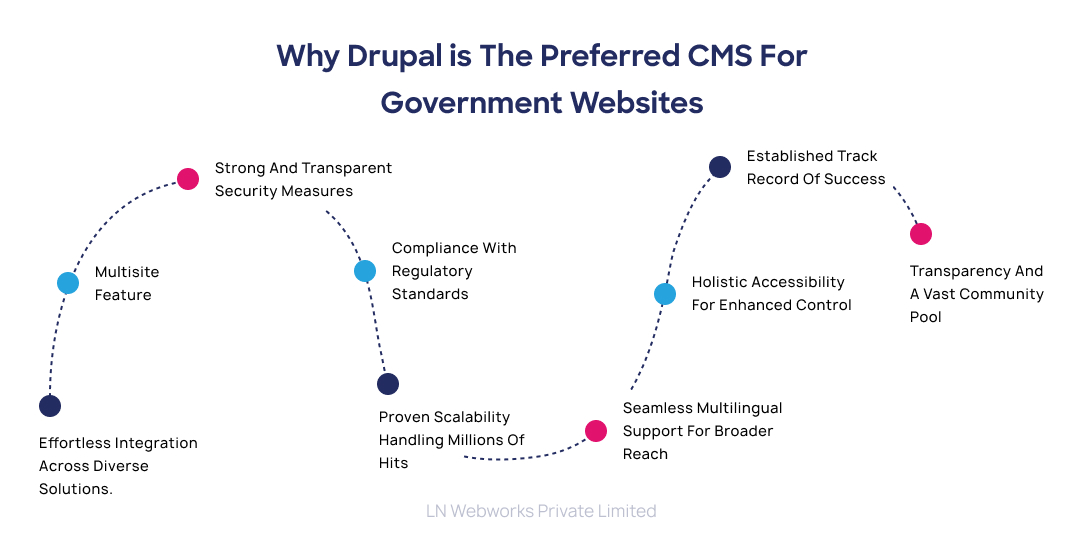Why Drupal Is the Best CMS for Government Sites: Top 9 Reasons

Government and public sector websites, powered by Drupal, play a vital role, serving as the virtual hub for a multitude of functions. These Drupal-based sites are not just informative platforms; they function as the digital town square—connecting people, facilitating business transactions, providing updates, and showcasing key attractions.
The responsibility of selecting the right content management system (CMS) falls on government officials. This decision comes with a low margin for error and high stakes. Government websites, designed with Drupal by a proficient Drupal development company, must fulfill numerous criteria, including being secure, scalable, engaging, and more.
Reasons That Makes Drupal The Best CMS For Government Sites
Considering the critical role government websites play, we’ve compiled 10 compelling reasons that answer – “Why Drupal for Government sites?”. Let’s get down to it!

1. Effortless Integration Across Diverse Solutions/Services
Drupal’s strength lies in its seamless integration with various solutions and services. This adaptability is crucial for government websites, allowing them to easily incorporate both current and future needs, including proprietary solutions. As an open-source CMS, Drupal’s modularity provides a solid foundation for effortless integration without any controlling authority dictating or limiting the process.
2. Multisite Feature
Drupal excels in accommodating multisites, a crucial feature for government and public sector CMS. The multisite capability simplifies the creation of additional sites by allowing developers to duplicate the main site’s code base, resulting in significant savings in both development costs and ongoing maintenance. What sets Drupal apart from proprietary options is its cost-effectiveness, thanks to being an Open Source CMS with no added fees for multiple sites. Drupal’s scalability is closely tied to its multisite functionality, enabling centralized maintenance of brand guidelines.
3. Strong and Transparent Security Measures
Security is a top priority for government websites, and Drupal’s reputation for robust and transparent security makes it a preferred choice in the public sector. Being Open Source allows government IT officials to access and scrutinize the code, ensuring thorough due diligence against hacking and cyber threats. The extensive Drupal community, with 1.3 million members, actively contributes security modules like Login Security, Password Policy, Captcha, and Security Kit.
4. Compliance with Regulatory Standards
Drupal CMS is adaptable to meet various government regulations, encompassing accessibility standards, data privacy laws, and open records policies. This flexibility ensures that government websites can be configured to align with legal requirements, safeguarding sensitive citizen data. An image of the Drupal CMS compliance checklist can be found at joomtechsolutions.com.
5. Proven Scalability Handling Millions of Hits
Drupal’s remarkable scalability is closely tied to its multisite feature, where the robustness of one site on the same Drupal code base positively impacts all others. The ability to handle millions of hits is crucial for government websites, ensuring readiness for surges in traffic during various scenarios such as weather alerts, civic events, or celebrations. Drupal has proven its capability by supporting some of the busiest government websites globally, adeptly managing sudden surges and consistently hosting millions of visitors each month without crashing.
6. Seamless Multilingual Support for Broader Reach
Multilingual support is seamlessly integrated into Drupal, supporting over 100 languages right from the start. While most major CMS platforms offer multilingual support, Drupal goes the extra mile with features like the Content Translation module, enabling the translation of pages and individual content by creating duplicate sets in different languages.
7. Holistic Accessibility for Enhanced Control
Drupal sets itself apart by being inherently accessible straight out of the box, a critical consideration for government and public sector websites. Drupal’s commitment to adhering to web accessibility standards, including the latest Web Content Accessibility Guidelines (WCAG 2.1), ensures that clients can rely on its compliance.
8. Established Track Record of Success
Drupal CMS boasts a widespread presence on numerous government websites globally, with notable examples including the White House, NASA, and the United Nations. Its extensive usage underscores its reliability and suitability for government purposes, instilling confidence in its ability to effectively cater to the intricate demands of government websites.
9. Transparency and a Vast Community Pool
The strength of the Drupal community, boasting 1.3 million members, is a significant asset for both developers and public sector clients. Having been part of this community for an extended period, we’ve witnessed firsthand the influence of a vast and committed network of 1.3 million members dedicated to the success of Drupal. Transparency is a hallmark of Drupal, built on a shared open-source development stack.
Let’s Wrap It Up!
In a word, choosing Drupal as the content management system for government websites is a decision rooted in practicality, security, and a proven track record of success. The compelling reasons discussed above highlight Drupal’s ability to seamlessly integrate diverse solutions, manage multiple sites efficiently, uphold robust security measures, comply with regulatory standards, and scale dynamically to handle millions of hits.
Want to make Drupal your default CMS or simply wish to know more about it? Well, LN Webworks Drupal experts are always there to help you out. Reach Out Now to learn more and get started!
